How I took part in the Each One, Reach Bhaiyo Campaign: My experience with different Bhaiyos
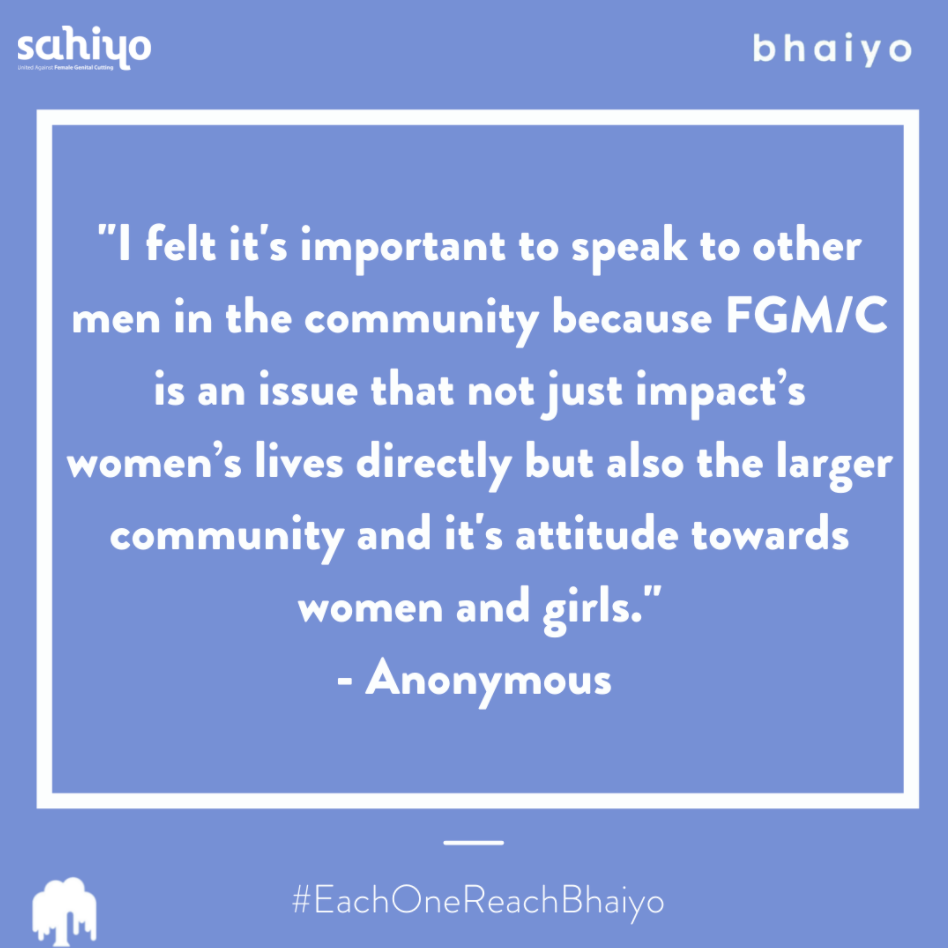
By Anonymous In honor of International Women’s Day on March 8th, Sahiyo launched our campaign “Each One, Reach Bhaiyo.” During this campaign, Sahiyo encouraged community members to reach out to and educate at least one male-identifying person in their life about female genital cutting (FGC). Through this campaign we involved men in the important work of protecting women and girls. We know that just one conversation can spark a global change towards preventing the human rights violation that is FGC amongst future generations. Learn more here. Why did you want to reach out to another man in your life to discuss female genital mutilation/cutting (FGM/C)? I felt it’s important to speak to other men in the community because FGM/C is an issue that not only impacts women’s lives directly, but also the larger community and its attitude towards women and girls. It is necessary to engage with men to build awareness and take steps towards change. Women and also men need to participate together to speak out against FGM/C. My usual interactions with community members are mostly with my own family, close relatives, and men who I have come across through the matchmaking process for marriage. I have a keen interest in discussing community life, rituals, beliefs, etc. with a critical lens to understand their meaning, relevance, and history. This has been part of my upbringing and an interest during my years of formal education, particularly from the perspective of gender in society. And so often my interactions with men while meeting them in arranged marriage or dating meetings are based on these topics. What was his reaction? Was he aware of FGM/C? I happened to meet a man called Z in his early 30s who was just finishing up his residency term in medicine and was to finally start his independent practice. We had similar observations and views about community practices and were able to have open conversations on many topics. I decided to ask him if he knew about the practice of Khatna. Z had grown up and was still living in a very orthodox community environment and that was his immediate world. However, education and studying medicine had given him an opportunity to be open minded, meet people from different backgrounds, and explore beyond community life. This was something he said he valued. Z told me that he came to know about the practice of Khatna while he was in college through some posts on Facebook and was shocked to find that this was never spoken about in his family or community life. He studied about it in detail and came to the conclusion that Khatna has no medical benefits as is often told. He started being active about his views against FGM/C online and his family came to know about his stance. It created a lot of agitation in his family and he was told to suspend all his interest in speaking out against the issue. He felt that he has a lot to lose if he is publicly vocal against Khatna and decided to stop his involvement. During our discussion, I told him that because of my father’s ability to question Khatna as unscientific and unnecessary, my sister and I did not go through it while we were young. My mother and grandmothers, who had all gone through Khatna themselves, were initially hesitant to not follow the tradition. I saw my father’s position as a crucial intervention. I shared with him Sahiyo’s work and approach to engage with community members. Z was not interested in being part of any group or discussions questioning FGM/C anymore. He continues to believe in private that the practice of Khatna should be stopped but cannot afford to risk his community life. What advice would you give to others trying to reach out to the men in their lives? In my experience with speaking to men, I came to know that a few of them are aware about FGM/C due to a lot of discussions and campaigns that are now visible on social media and easily accessible. However some are also completely unaware or don’t want to broach the subject. I have noticed that men have the ability to empathise to an extent due to their own experiences of going through male circumcision. Khatna is not about preserving a tradition but a practice of violence that has a prolonged impact on many women who go through it. This does not align with the values of modern education that the Dawoodi Bohra community strives for. I would urge others to speak with men about FGM/C, and open up conversations to share experiences, facts, and outcome of research studies to help them understand better. Even if men can’t come forward openly to their own families, I believe a conversation can certainly open up possibilities for the future.
How I took part in the Each One, Reach Bhaiyo Campaign: Turning my older brothers into Bhaiyos
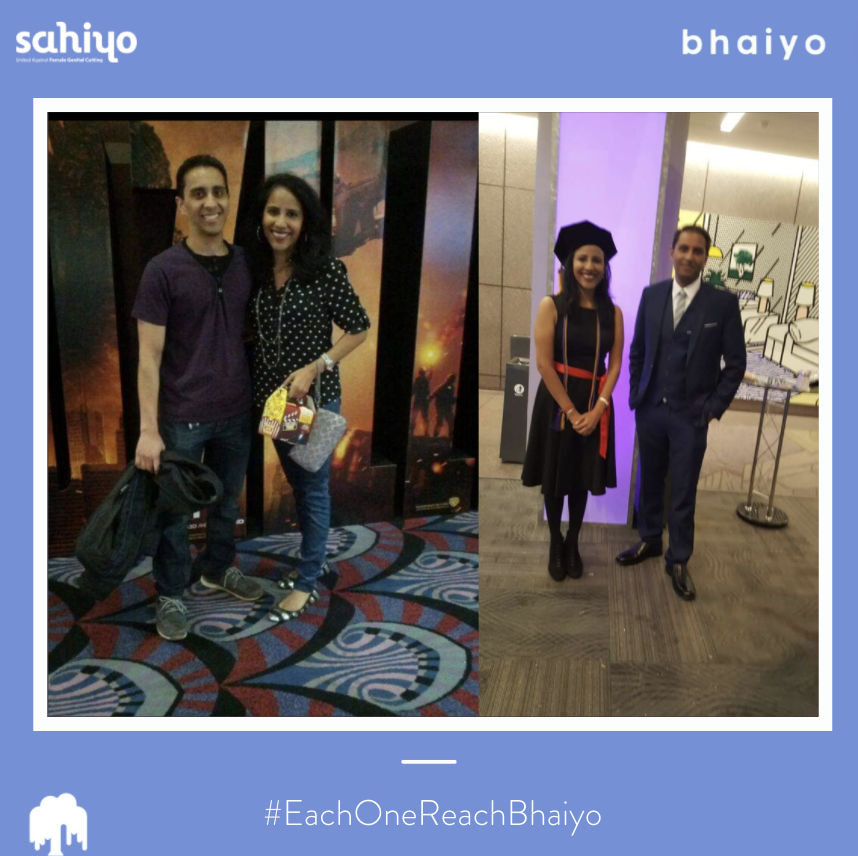
By Nesha Abiraj In honor of International Women’s Day on March 8th, Sahiyo launched our campaign “Each One, Reach Bhaiyo.” During this campaign, Sahiyo encouraged community members to reach out to and educate at least one male-identifying person in their life about female genital cutting (FGC). Through this campaign we involved men in the important work of protecting women and girls. We know that just one conversation can spark a global change towards preventing the human rights violation that is FGC amongst future generations. Learn more here. Why did you want to reach out to a man in your life to discuss FGM/C? I decided to reach out to my two older brothers and talk about FGM/C, in order to bring more men into the space of advocating to end harmful practices against women and girls. I chose my brothers because, in addition to knowing they could not say “no” to me as the only girl and the youngest of us three, I knew this would appeal to their sense of compassion, empathy, and humanity. I also know they both have platforms which they could use to ignite conversations around the harmful consequences of FGM/C; my eldest brother works in foreign affairs and my elder brother is a doctor who specializes in infectious diseases and internal medicine. What was his reaction? Both were shocked to learn that the practice of FGM/C existed. They also expressed sentiments of outrage and disappointment upon learning just how many women and girls around the world have had to endure this practice and the fact that millions more continue to be at risk. My eldest brother shared with me the next day a recollection that a female co-worker had confided in him several years ago about being subjected to such a practice when she was just a child. At the time he had not connected the dots and recognized it as being FGM/C or had the terminology to call it such, and only made the connection after I had spoken to him about it. Since our initial conversation, I have had many conversations with my elder brother around FGM/C and the intersectionality with infectious diseases, as well as the harmful consequences of medicalized FGM/C. What advice would you give to others trying to reach out to the men in their lives? Admittedly I do share a close bond with my brothers and they are a central part of my life, so it was easy for me to speak to them and I know that may not necessarily be the case in all instances. What I can say to others, and what I know to be true from my own experience, is conversations like this might be difficult or uncomfortable or daunting or even flat out scary or all of the above, but it is worth it, for the sake of the millions of women and girls who continue to be at risk. Never underestimate the power of one single voice to make a difference in the life of someone else. Up until I spoke to my eldest brother, I had no knowledge or evidence that FGM/C was even an existent practice in the Eastern Caribbean, and all it took was one conversation to change that.
How I took part in the Each One, Reach Bhaiyo Campaign: Turning my father and law colleagues into Bhaiyos
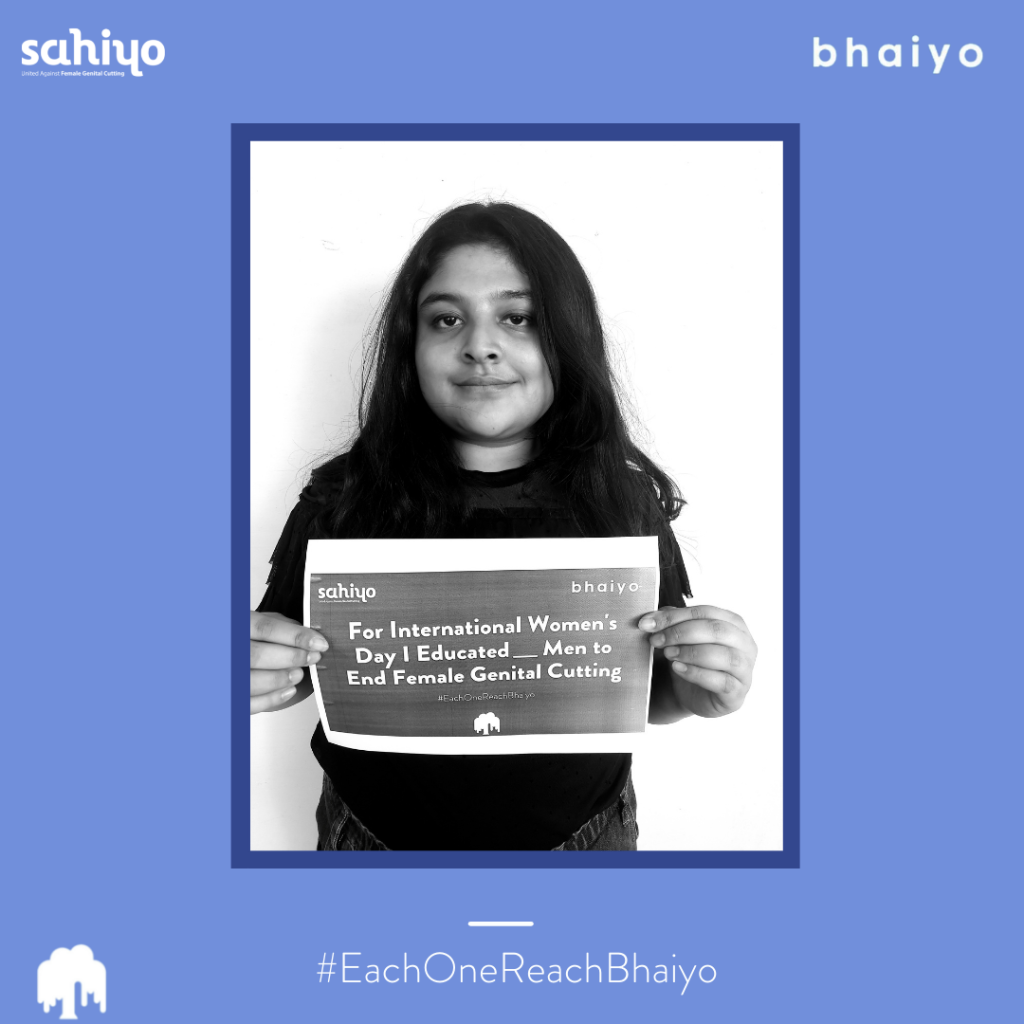
By Priyodarshini Chatterjee In honor of International Women’s Day on March 8th, Sahiyo launched our campaign “Each One, Reach Bhaiyo” to encourage community members to reach out to and educate at least one male-identifying person in their life about female genital cutting (FGC). Through this campaign we involved men in the important work of protecting women and girls. We know that just one conversation can spark a global change toward preventing the human rights violation that is FGC amongst future generations. Learn more here. In India, there are many forms of gender-based violence that folks like you and me are aware of. It may be domestic violence, dowry death, sexual harassment in workplaces, etc., but one form of gender-based violence, not known publicly until recently is the practice of khatna, or female genital cutting (FGC). I came across this term first when I read an article on the United Nations Development Programme website. A quick search then gave way to a compulsive need for prevention of this practice in a 12-year-old me. It was much later when news regarding this practice reached me again. It was in the form of a video by a popular Indian think tank, ‘Scroll.’ In the video, the survivors were voicing their stories. It brought to my attention how harmful this practice is and how spreading awareness was necessary. So, I decided that it had to start from the roots and move to the branches. Thus, starting from home made sense. Thanks to Sahiyo’s campaign, Each One Reach Bhaiyo, which encourages staff, volunteers, and community members to reach out to and educate at least one male-identifing person in their life about FGC and encourage them to join the Bhaiyo (male ally) program, I finally brought up this topic at my dinner table. My father was very sympathetic, showing concern for the state of women in our country. He expressed how “we don’t have any idea what these women face because of their circumstances.” My brother was the next Bhaiyo I talked to. He voiced how it was an unjust and unfair practice. The realities of gender-based violence against women in India hit him hard. He could not fathom it and empathized with the survivors. I then took this initiative to the Bhaiyos in my university. Being in law school helped the dissemination of knowledge regarding this practice to the men in my school who had never heard about FGC before. They expressed their concern and how they wanted to contribute in their way. I informed them about Sahiyo and how they could navigate from thereon. They were very impressed and grateful to Sahiyo for actively spreading awareness and taking progressive steps towards complete prevention. They had read some pieces on the Sahiyo website to learn more about FGC. As a result of reaching out to them, they made it a point to spread the word ahead and help however they could. So, thank you so much Sahiyo for bringing in this initiative. The 12-year-old me is ever grateful for this massive progress regarding FGC that you have brought forth in India. The path to take effective steps for prevention has been forged by you. Today, maybe only a handful of Bhaiyos, but tomorrow we all will be a Sahiyo (friend) to this cause.
How I took part in the Each One, Reach Bhaiyo Campaign: Turning my Dad into a Bhaiyo
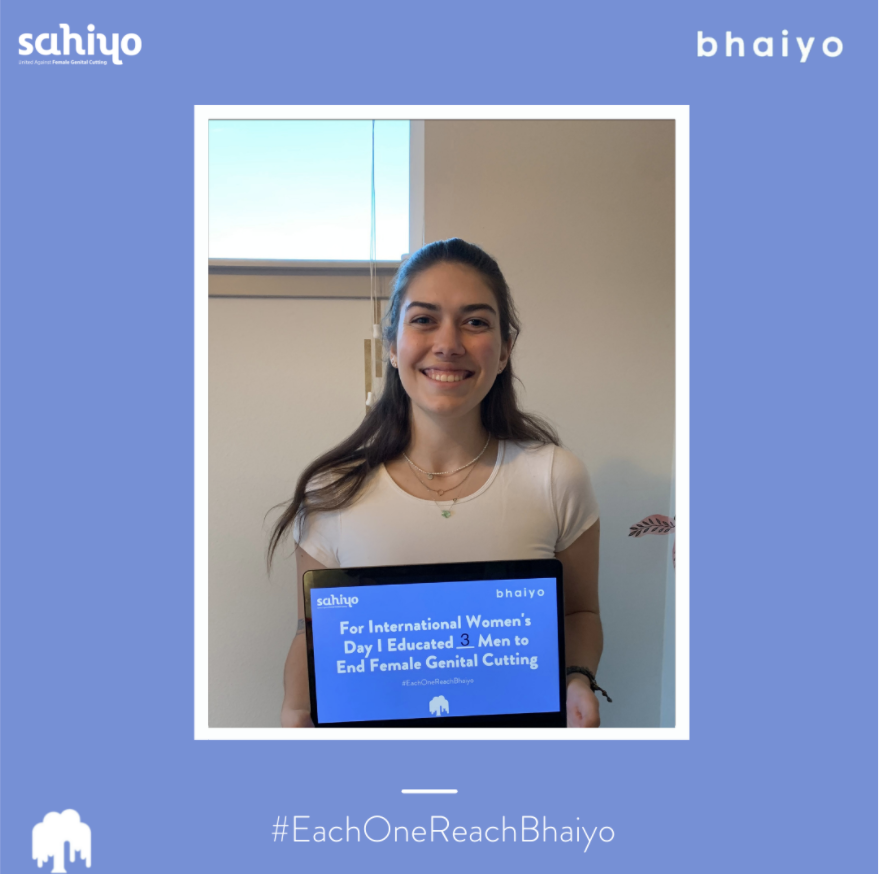
By Meg Sinnott In honor of International Women’s Day on March 8th, Sahiyo launched our campaign “Each One, Reach Bhaiyo.” During this campaign, Sahiyo encouraged community members to reach out to and educate at least one male-identifying person in their life about female genital cutting (FGC). Through this campaign we involved men in the important work of protecting women and girls. We know that just one conversation can spark a global change towards preventing the human rights violation that is FGC amongst future generations. Learn more here. Why did you want to reach out to a man in your life to discuss FGM/C? I decided to reach out to a man in my life because I believe that advocacy for FGM/C and other gender-based violence must include men. In order to change cultural and traditional practices, the whole community has to be involved. Additionally, the systems that have supported FGM/C are patriarchal and stem from the control of women’s bodies and sexuality. If men uphold those systems and beliefs they are complicit in allowing the practice to continue. I spoke to my dad specifically because while he is a highly educated and intelligent man, he has been somewhat blind to women’s struggles when I have brought them up with him in the past. What was his reaction? He was very supportive of Sahiyo’s mission upon learning more about the scope of modern-day FGM/C in the Bohra community. As a white atheist, he had some trouble understanding at first why mothers would continue to subject their daughters to FGM/C if they themselves disagreed with it because he has never followed a religious practice. However, after a discussion on the impact of social norms on the actions of individuals, he came to see that FGM/C is a multifaceted issue. Was he aware of FGM/C? While he was aware of FGM/C he did not know the different types, nor did he know that it was commonly practiced in communities outside of Africa. Additionally, he was not aware of the reasons that FGM/C was being practiced, nor that it was most commonly done by older women and not medical professionals. What advice would you give to others trying to reach out to the men in their lives? I would tell others reaching out to men in their lives that they should not be worried about a negative reaction. Any conversation is important to spreading awareness and bringing an end to FGM/C!
How I took part in the Each One, Reach Bhaiyo Campaign: Turning neighbors, friends, and community members into Bhaiyos
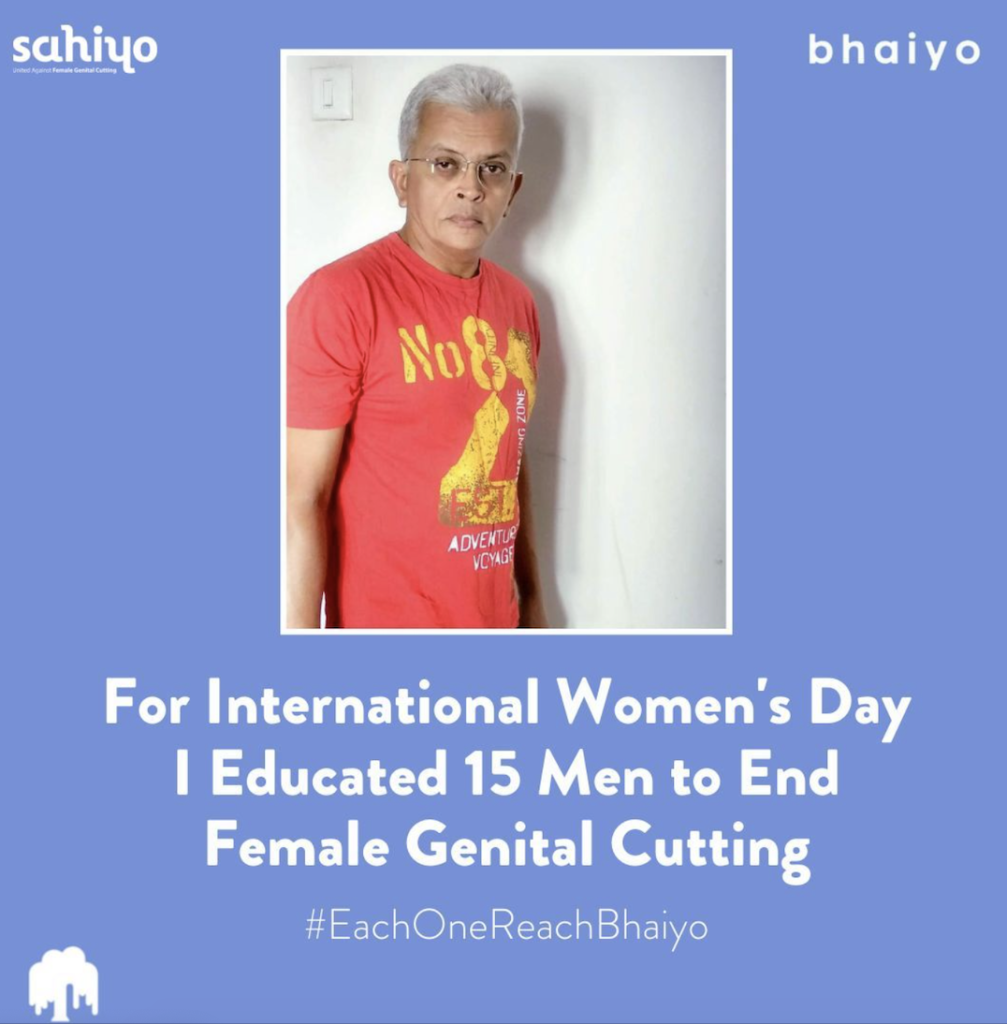
By Hakim Bhai In honor of International Women’s Day on March 8th, Sahiyo launched our campaign “Each One, Reach Bhaiyo.” During this campaign, Sahiyo encouraged community members to reach out to and educate at least one male-identifying person in their life about female genital cutting (FGC). Through this campaign we involved men in the important work of protecting women and girls. We know that just one conversation can spark a global change towards preventing the human rights violation that is FGC amongst future generations. Learn more here. When I spoke with one of my neighbours, Kinjalbhai, that in some Muslim sects, women are ‘circumcised,’ he said he did not know what this ‘circumcision’ meant and have never heard about it! Similarly, when I informed my friend Sandeepbhai Salikia, he too became speechless! I tried to have a conversation with 15 men who are not from my community. Surprisingly, I found out that none of these men knew such a harmful practice continues to happen even in today’s age. I feel all my brothers from my community are silent in spite of knowing everything in their minds about female Khatna and pretend to be strangers to people of other religions! I am trying to reach out to more and more people and make them aware of this practice. મારા એક પડોશી કિંજલભાઈને જ્યારે મેં જણાવ્યું કે અમુક મુસ્લિમોના સંપ્રદાયો માં સ્ત્રીઓની ‘ખતના’ કરવામાં આવે છે. ત્યારે એ ભાઈને ખબર જ નહોતી કે આ ‘ખતના’ એટલે શું ! આવી જ રીતે મારા મિત્ર સંદીપભાઈ સાળકીયાને જાણ કરી ત્યારે તેઓ પણ અવાક બની ગયા ! મેં લગભગ 15 પુરુષોને આ બાબત જાણ કરીને વાત કરી. નવાઈની બાબત મને એ જણાઈ કે આમાંના એક પણ પુરુષને આવી કુપ્રથા અસ્તિત્વ ધરાવે છે આજના યુગમાં પણ એની કોઈ માહિતી જ નહોતી ! મારા બધા જ્ઞાતિ બંધુ દાઉદી વ્હોરા પુરુષો આ સ્ત્રીઓની ખતના બાબતે મનમાં બધું જાણવા સમજવા છતાંય ચૂપ છે અને અજાણ્યા હોવાનો ડોળ કરે છે ઈતર ધર્મના લોકો પાસે !મારી કોશિશ રહે સે કે હું વદારે ને વધારે લોકો સુધી પહોંચી શકું અને આ વિષય પર લોકોને જાગૃત કરું
